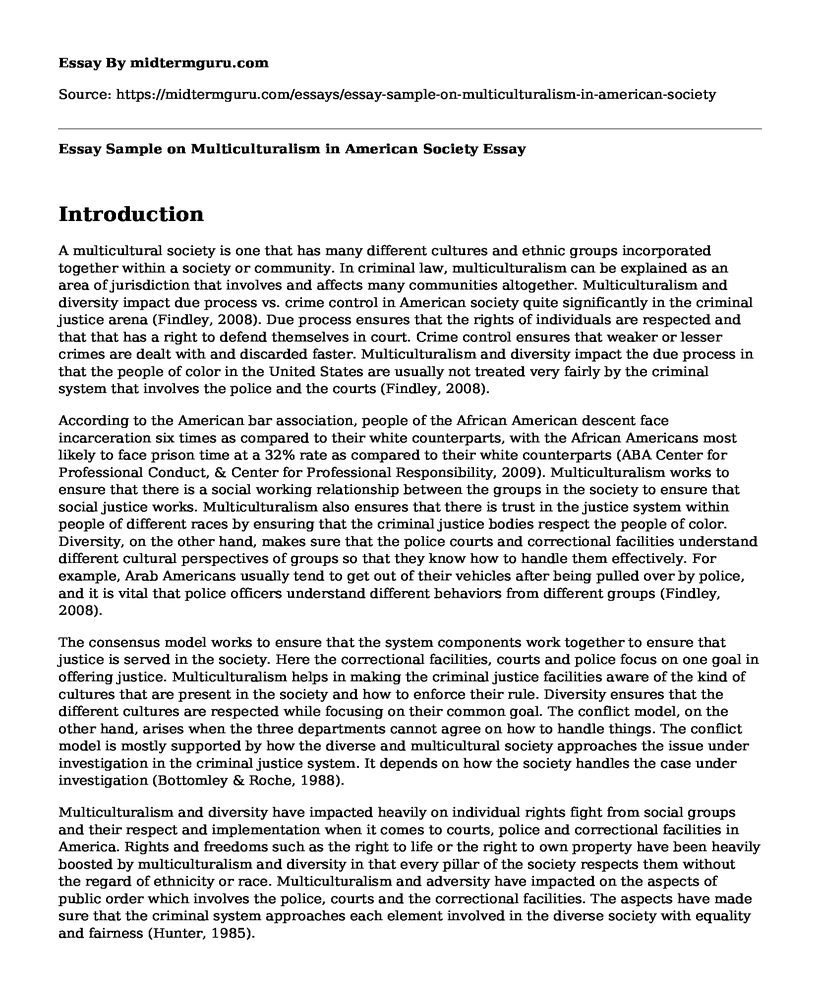Introduction
A multicultural society is one that has many different cultures and ethnic groups incorporated together within a society or community. In criminal law, multiculturalism can be explained as an area of jurisdiction that involves and affects many communities altogether. Multiculturalism and diversity impact due process vs. crime control in American society quite significantly in the criminal justice arena (Findley, 2008). Due process ensures that the rights of individuals are respected and that that has a right to defend themselves in court. Crime control ensures that weaker or lesser crimes are dealt with and discarded faster. Multiculturalism and diversity impact the due process in that the people of color in the United States are usually not treated very fairly by the criminal system that involves the police and the courts (Findley, 2008).
According to the American bar association, people of the African American descent face incarceration six times as compared to their white counterparts, with the African Americans most likely to face prison time at a 32% rate as compared to their white counterparts (ABA Center for Professional Conduct, & Center for Professional Responsibility, 2009). Multiculturalism works to ensure that there is a social working relationship between the groups in the society to ensure that social justice works. Multiculturalism also ensures that there is trust in the justice system within people of different races by ensuring that the criminal justice bodies respect the people of color. Diversity, on the other hand, makes sure that the police courts and correctional facilities understand different cultural perspectives of groups so that they know how to handle them effectively. For example, Arab Americans usually tend to get out of their vehicles after being pulled over by police, and it is vital that police officers understand different behaviors from different groups (Findley, 2008).
The consensus model works to ensure that the system components work together to ensure that justice is served in the society. Here the correctional facilities, courts and police focus on one goal in offering justice. Multiculturalism helps in making the criminal justice facilities aware of the kind of cultures that are present in the society and how to enforce their rule. Diversity ensures that the different cultures are respected while focusing on their common goal. The conflict model, on the other hand, arises when the three departments cannot agree on how to handle things. The conflict model is mostly supported by how the diverse and multicultural society approaches the issue under investigation in the criminal justice system. It depends on how the society handles the case under investigation (Bottomley & Roche, 1988).
Multiculturalism and diversity have impacted heavily on individual rights fight from social groups and their respect and implementation when it comes to courts, police and correctional facilities in America. Rights and freedoms such as the right to life or the right to own property have been heavily boosted by multiculturalism and diversity in that every pillar of the society respects them without the regard of ethnicity or race. Multiculturalism and adversity have impacted on the aspects of public order which involves the police, courts and the correctional facilities. The aspects have made sure that the criminal system approaches each element involved in the diverse society with equality and fairness (Hunter, 1985).
The Judeo-Christianity views have impacted on the justice system greatly by promoting love before justice. Justice according to Judeo-Christianity stresses on the aspects of impartiality (Deuteronomy 1;16-17), the proportionality of justice according to what offense a person has committed (Leviticus 24;17-21) and the conformity to the standards set by God (Leviticus 19:35-36). These principles have significantly impacted how the criminal justice system conducts its affairs (Ellis, 1985).
References
ABA Center for Professional Conduct, & Center for Professional Responsibility (American Bar Association). (2009). Model rules of professional conduct. American Bar Association.
Bottomley, A., & Roche, J. (1988). Conflict and consensus: a critique of the language of informal justice (pp. 86-107). Sage.
Ellis, L. (1985). Religiosity and criminality: Evidence and explanations of complex relationships. Sociological Perspectives, 28(4), 501-520.
Findley, K. A. (2008). Toward a new paradigm of criminal justice: how the innocence movement mergers crime control and due process. Tex. Tech L. Rev., 41, 133.
Hunter, A. (1985). Private, parochial and public social orders: The problem of crime and incivility. The challenge of social control: Citizenship and institution building in modern society.
Schmalleger, F., Donaldson, S., Kashiwahara, K., Koppal, T., Chase, S., Brown, A., ... & Marash, D. (2014). Criminal justice today. Prentice Hall.
Cite this page
Essay Sample on Multiculturalism in American Society. (2022, Sep 12). Retrieved from https://midtermguru.com/essays/essay-sample-on-multiculturalism-in-american-society
If you are the original author of this essay and no longer wish to have it published on the midtermguru.com website, please click below to request its removal:
- Paper Example on Occupational Therapy: Culturally Diverse Families
- Critical Essay on Race, Police, and the Making of a Political Identity
- Why I Desire To Be an Alpha Man - Essay Sample
- Article Analysis Essay on Online Collaboration: Scientists and the Social Network
- Chicano Art: A Unique US Style, Driven by Pre-Columbian & European Influences - Essay Sample
- Mental Illness as a Subculture: Common Attitudes and Beliefs - Essay Sample
- Population Growth: An Unsustainable Threat to the Environment - Essay Sample







